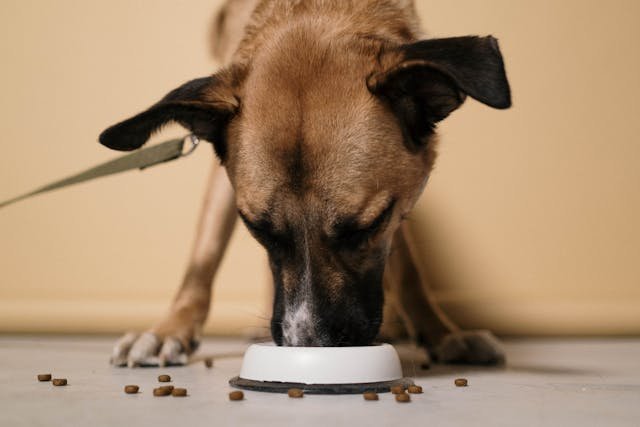
Dog nutrition is a complex and essential aspect of pet care, ensuring that our furry friends lead healthy and happy lives. Understanding the science behind dog nutrition can help pet owners make informed choices about their dogs’ diets. This article delves into the crucial elements of dog nutrition, examining the various nutrients and dietary requirements necessary for optimal health. By exploring the components of a balanced diet, common nutritional concerns, and the benefits of proper feeding, you can better appreciate the importance of nutrition in maintaining our dogs’ well-being. Let’s explore the science behind fueling your fur baby for a vibrant and energetic life.
The Importance of Proteins
Proteins play a vital role in dog nutrition, serving as the building blocks for muscles, skin, hair, and other tissues. They are composed of amino acids, which are crucial for growth, repair, and maintaining body functions. Dogs require a variety of amino acids, some of which are essential and must be obtained through their diet. High-quality animal proteins, such as those from meat, poultry, and fish, are ideal sources for fulfilling these needs. A diet rich in proteins ensures that dogs maintain muscle mass, heal properly, and have the energy needed for daily activities.
The Role of Carbohydrates
Carbohydrates are an essential source of energy for dogs, providing the fuel needed for physical activity and proper organ function. They are broken down into glucose, which is used by the body as a primary energy source. While dogs can survive on a low-carb diet, including carbohydrates can enhance their energy levels and overall vitality. Sources of carbohydrates include grains, vegetables, and fruits, which also supply fiber for digestive health. Balancing the intake of carbohydrates is crucial to avoid excessive weight gain and to ensure sustained energy throughout the day.
Essential Fats for Health
Fats are another critical component of dog nutrition, providing concentrated energy and supporting various bodily functions. Essential fatty acids, such as omega-3 and omega-6, are vital for maintaining healthy skin, a shiny coat, and proper brain function. These fats also play a role in reducing inflammation and supporting cardiovascular health. Including sources of healthy fats, like fish oil, flaxseed, and chicken fat, in a dog’s diet can improve their overall well-being. However, it is important to regulate fat intake to prevent obesity and associated health issues.
Vitamins and Minerals
Vitamins and minerals are essential micronutrients that support various physiological processes in dogs. Vitamins such as A, D, E, and K, along with B-complex vitamins, are necessary for immune function, vision, skin health, and energy metabolism. Minerals like calcium, phosphorus, and potassium are crucial for bone health, nerve function, and muscle contraction. A balanced diet that includes a variety of foods ensures that dogs receive an adequate supply of these vital nutrients. Pet owners should be cautious with supplements, as excessive intake of certain vitamins and minerals can lead to toxicity and health problems.
Hydration and Water Intake
Proper hydration is fundamental to a dog’s health, as water is involved in virtually every bodily function. Water regulates body temperature, aids in digestion, and helps in the absorption of nutrients. Dogs need constant access to fresh water, especially after physical activities or in hot weather. Dehydration can lead to serious health issues, including kidney problems and heatstroke. Ensuring that dogs drink enough water daily is as crucial as providing a balanced diet for their overall health and well-being.
Understanding Dietary Needs by Life Stage
Dogs have different nutritional requirements at various stages of their lives, from puppies to seniors. Puppies need higher levels of protein and fat to support rapid growth and development, while adult dogs require balanced nutrients to maintain their health. Senior dogs might need fewer calories but more fiber and certain supplements to support aging joints and organs. Understanding these changing needs helps pet owners provide appropriate diets that support their dogs’ health throughout their lives. Consulting with a veterinarian can offer guidance on the best dietary choices for each life stage.
Addressing Common Nutritional Concerns
Some dogs have specific nutritional needs or health conditions that require special dietary considerations. Allergies, intolerances, and chronic conditions like diabetes or kidney disease can necessitate tailored diets. Identifying and addressing these issues with the help of a veterinarian ensures that dogs receive the nutrition they need without exacerbating their conditions. Specialized diets, such as hypoallergenic or prescription foods, can manage symptoms and improve the quality of life for affected dogs. Regular health check-ups and monitoring can help adjust diets as needed to address any emerging concerns.
The Benefits of Proper Feeding
Proper feeding is essential for the overall health and well-being of your dog, ensuring they receive the nutrients necessary for growth, energy, and a strong immune system. One of the key benefits of selecting high-quality options, such as salmon dog food , is the provision of omega-3 fatty acids, which promote a healthy coat and skin. Additionally, salmon dog food can aid in reducing inflammation and supporting joint health, which is particularly beneficial for older dogs or those with arthritis. Ensuring your dog receives balanced nutrition helps maintain a healthy weight, preventing obesity-related issues. Ultimately, choosing the best salmon dog food contributes to a longer, healthier, and happier life for your furry companion.
Conclusion
In conclusion, understanding the science behind dog nutrition is essential for ensuring the health and happiness of our furry friends. By focusing on the right balance of proteins, carbohydrates, fats, vitamins, and minerals, pet owners can provide a diet that supports their dogs’ physiological needs. Proper hydration, awareness of life stage requirements, and addressing specific nutritional concerns further enhance a dog’s well-being. Adopting mindful feeding practices completes the approach to optimal nutrition, ensuring dogs lead vibrant and energetic lives. Through informed choices and regular veterinary consultations, pet owners can fuel their fur babies with the best possible nutrition for a long and healthy life.










